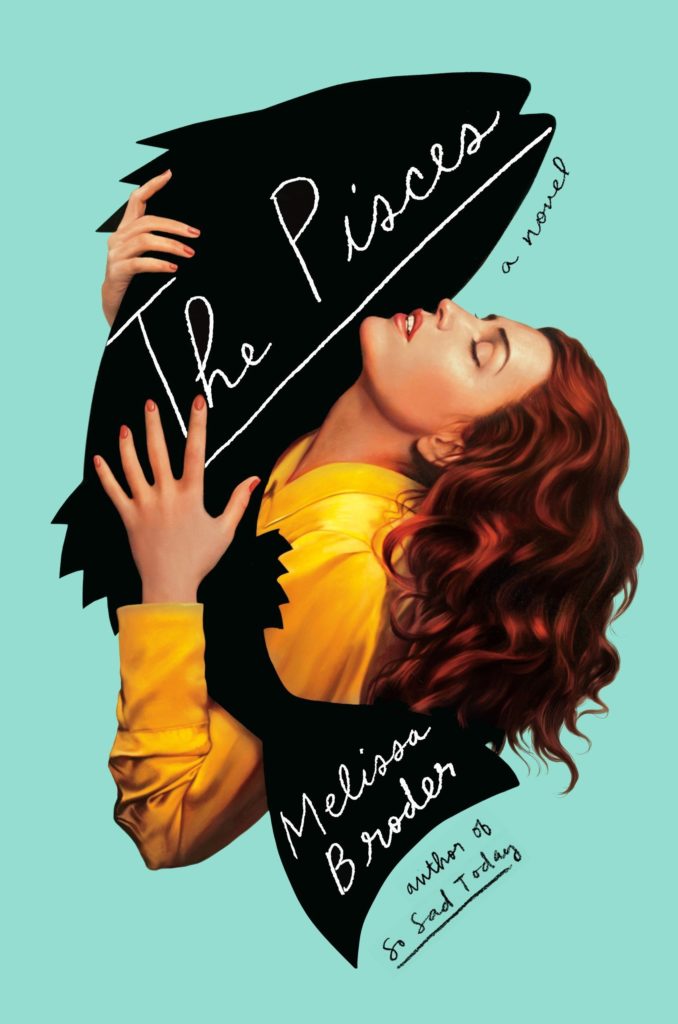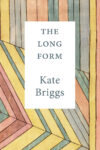I first became familiar with Melissa Broder’s poetry in 2013, when she read at a launch party for the Columbia Journal, of which I was an editor at the time. I was immediately smitten with her darkness and humor (and the fact that she invited everyone at the party to come hang out with her at a cemetery after). Three years later, in 2016, I had the chance to chat with Broder about writing nonfiction as part of the Non-Fiction by Non-Men series on Fiction Advocate, in honor of the publication of her essay collection So Sad Today. Now it’s 2018, and this time Broder has written a novel, The Pisces, published on May 1 by Penguin Random House.
The Pisces is, like all of Broder’s work, both funny and sinister. The novel explores the themes of love, lust, obsession, anxiety, and depression through the story of Lucy, a thirty-eight-year-old academic writing a book about Sappho, who finds herself dog-sitting for her sister in Venice Beach one summer after a bad break up. As Lucy takes care of Dominic, her sister’s dog, a creature that loves her unconditionally and completely, she finds herself drawn to the ocean’s edge where she meets and falls in love with a mer-man, Theo. It is this complicated, ill-fated, human/mer-person romance that drives the narrative, set in a magical world that blends modern day Los Angeles with ancient Greece. Only Broder could write a novel that spans the range from literary analysis of Sappho’s poetry to that shitty feeling after drunk-sexting an ex.
This spring, I had the opportunity to speak with Broder again, this time about her novel.

E.B. Bartels: After writing poetry and essays, how does it feel to tackle fiction?
Melissa Broder: I never thought I would write a novel. I never even thought I would write prose. But the essays in So Sad Today came about because I had just moved from New York to LA, and when I lived in New York I wrote poems on the subway, but I don’t want to text and drive, so living in LA, I started dictating my work in the car. All of my lines started getting longer and more conversational, and that’s how the essays were formed.
After I finished writing So Sad Today, I still really wanted to explore these themes of love as addiction, the dichotomy between fantasy love and substantial lasting love, and why sometimes the more unattainable love can feel more real than a love that is right there and abundant and unconditional. So I was sitting on the beach in Venice reading a book called The Professor and the Siren by Giuseppe Tomasi di Lampedusa, which is about a man and a mermaid. And it dawned on me how the human/mer relationship really captures all these themes, but why does it always have to be a mermaid and an older dude? Why not a merman and an older woman? The book was born whole to me right there, but I thought I can never write a novel. I didn’t know that I could. But I decided to try dictating three paragraphs a day, just as an experiment, and within nine months I had a full first draft.
That’s so cool that you used dictation! Is your phone just full of voice memos?
I use Siri and a notes app, so it translates it. Though it gets a lot of stuff wrong. During the dictation process, I didn’t edit or go back and fix anything. I like to give myself permission to be really messy in that first draft, to just get it all down on paper. But then my first round of edits was mostly correcting what Siri had translated wrong, or trying to figure out what I said.
You know, dictation seems unusual now, but I guess back in the day a lot of old man authors would dictate their novels to their secretaries, right?
Yeah! Siri is my secretary! It is really cool. And, for me, it creates more ease. I think really fast, so my mouth can keep up with it better than my hands can.
As a poet, the challenge for me was trying to understand why would someone say in 200 pages what you can say in two. Poetry is all about distillation. The art of storytelling is kind of the opposite––it’s all about that flourish and taking people on a long ride. For me, the generation of all of that text is a lot, and, in some ways, it was my biggest challenge. I am used to editing, because, as a poet, it’s all about refining and refining. But being a writer is different from being a sculptor, because sculptors have their clay. Writers have to make our clay. Dictation was a natural way for me to make that clay, which then I could sculpt.
What other parts of writing fiction were challenging for you?
Narrative structure has never really been my forte. In a poem, really anything goes. You just have to teach people how to inhabit that world, and then you can do whatever you want. For example, when you’re exploring sex in a poem, it doesn’t have to be linear. But in a story, if someone is wearing a pair of underwear, it’s like Chekhov’s gun. It’s Chekhov’s underwear––the underwear must come off!
Right. You have to be careful, or you’re going to get all those Internet trolls who like to analyze movie continuity errors coming after you.
Exactly!
So you said that The Pisces was exploring a lot of the same themes as So Sad Today, and also as your poems. What was it like to explore those themes in fiction, as opposed to in essays or poetry?
A lot of writers have the same obsessions their whole lives. We write what is the fire for us. But it’s interesting, for example, writing about depression in personal essays versus exploring it in fiction––at first I didn’t even realize that Lucy was depressed, but she is so obviously depressed. It’s the way I see the world, and that is going to flavor whatever I write, regardless of genre, because it is such a big part of how I experience of the world. It’s hard to shake certain fundamental experiences of the world, even when you’re creating a character that isn’t you.
It is different to explore the themes in fiction as opposed to essays or poetry, insofar as it is different for me to write fiction than essays or poetry. These will probably always be my themes, no matter what I write. It’s not even a conscious choice. It was a choice to try fiction. After I finished So Sad Today, I started writing poems again, but I felt like I was writing the same poems as in Last Sext and Scarecrone. The poems were coming out the same. I hadn’t evolved in my approach; I still had the same questions. So to write a novel was to explore those questions from another angle.
The reoccurring themes thing is so true. That happens to me all the time. I will think I am writing just like a pleasant little book review, and all of a sudden I realize, whoops, I am writing about anxiety and death again.
Exactly! When I look back on my poems from third grade or my shitty poems from high school, it’s all the same obsessions! In third grade I was writing about food, but I was really writing about appetites and hunger and if there is enough. I was writing about a candy store, but I was still writing about it from that perspective.
It’s funny because we do change, but in some ways we come out of the womb as we are. It’s like they say, character is fate. Obsessions are inescapable. You can see it threaded throughout, even when you think you’re writing about something totally different.
I had a professor in grad school who said all writers have one itch they are trying to scratch.
Yes! It’s so true.
So you already mentioned The Professor and the Siren, but were there other texts that were inspiration for The Pisces? I loved how the whole novel is seeped in Greek mythology.
There are three books I read, pretty much in a row, right before I started The Pisces, which all had an influence on it though I didn’t realize it until after I was writing. The first was The Lost Daughter by Elena Ferrante, which is set at the beach and is about a woman and her internal life. Then Death in Venice by Thomas Mann strangely also had a big impact because it is a book about obsession and it is also by the sea. And then, as a poet, it was so nice to have Sappho along for the ride in my first novel. Sappho felt like a spirit guide from the poetry world, a bridge into the land of the novel, and she came into the book so seamlessly. Had Lucy been an economics student or a realtor, she may not have been as likely to see a merman, but because she is so seeped in mythology and Sappho, it is part of her world. And even though our technology is different, the world looks different, Sappho’s longing is Lucy’s longing––a romantic and a spiritual longing. That doesn’t change no matter where we are.
Yeah, there are certain themes that feel universal, that writers have been trying to get at for centuries. It’s like we all have a collective itch. It doesn’t matter if you’re in LA or ancient Greece.
Seriously. On Venice Beach, I would look up at the Santa Monica Mountains and think, this could easily be Greece. You squint and it’s Greece.
Speaking of ancient themes, I also loved how you explored the human/animal bond through Lucy’s relationship with her sister’s dog, Dominic, and the unconditional love Dominic kept giving Lucy that she kept rejecting. How did you decide to have a dog be one of the main characters?
A dog, for me, is unconditional love, and also the responsibility of love. It’s both that warmth and beauty and it’s also like sometimes you don’t feel like walking your dog. I have a dog. I am obsessed with him. But sometimes you don’t feel like walking your dog, and you have to do it anyway. Or you have to take your dog to the vet, or you have to leave somewhere you don’t want to leave to go home and deal with your dog. Those are the times when love isn’t exciting––when love is a verb, when it’s about showing up. And Lucy doesn’t know how to do that. For her, love is a boyfriend who is distanced and removed, so she thinks she wants it because it is easy to pine for what is not fully there, and she didn’t have to have responsibility because he wasn’t asking much of her. But a dog is dependent on you. A dog is a symbol of pure love and also love as responsibility, so I knew from the beginning there was a dog in there.
Finally, I have to ask, how do you feel about the 1989 animated classic The Little Mermaid?
You know, I was never a mer-fan. If you ask me to choose my top five mythological creatures, a mermaid wouldn’t even be up there. I would much rather hang around with a Pegasus.
Really?
Yeah, it was only after I read The Professor and the Siren that I looked back at all the mer myths and siren myths that I had read, and I realized how the inability for this love to truly be really embodies the struggle that I am exploring. I had never seen how dark it was before.
So dark! Maybe I just like depressing books, but I really loved the darkness that surrounded Lucy’s relationship with the merman. Fairy tales now get the Disney treatment and everything is bright and happy, but the originals are sometimes really sinister and kind of fucked up.
Seriously.
So what are your top five mythological beings?
I love the Pegasus. I definitely like the Kraken, the giant squid, which is sort of mer-man adjacent, I guess. I love Cerberus, the hounds of hell, and Circe from The Odyssey, and Apollo, the sun god.
Are you going to write a book about any of those?
Not today. But you never know.
This post may contain affiliate links.







